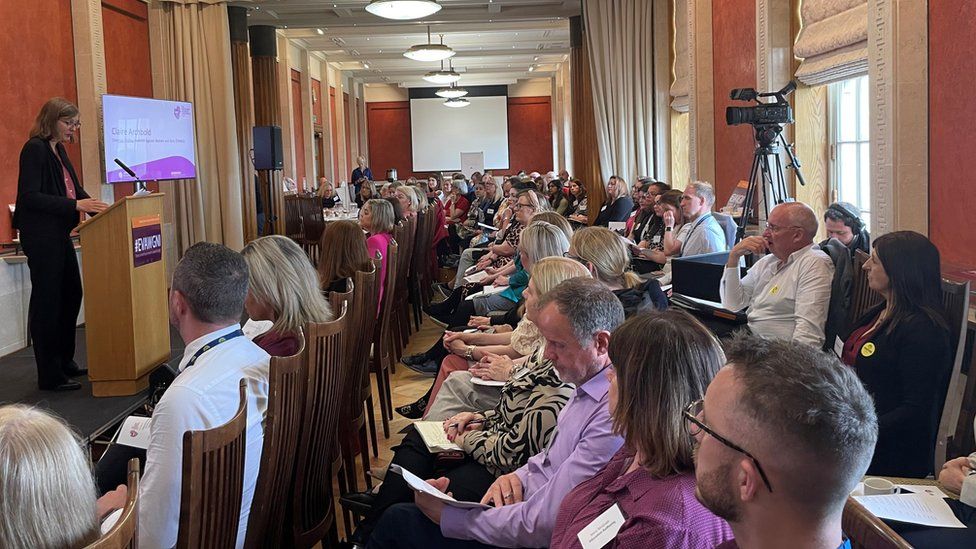Violence against women: Men and boys urged to speak out
- Published

Everyone in Northern Ireland has a role to play when it comes to tackling violence against women and girls, a conference in Belfast has heard.
Men and boys, in particular, must be prepared to speak out against male violence towards women if change is to happen, said speakers.
The Stormont event on Tuesday focused on the so-called Bystander Approach.
It looks at how people can address situations where women and girls are being subjected to abuse of any kind.
Politicians and community groups were among those who attended the conference which was organised by the Ending Violence Against Women and Girls directorate, which is already working to develop a strategy on the issue on behalf of the executive.
In February, new domestic abuse laws came into force in Northern Ireland, making coercive control a specific offence..
Legislation was also passed in the same month to tackle stalking.
Dr Jackson Katz is best known for pioneering the Bystander Approach and is co-founder of Mentors in Violence Prevention (MVP), a long-running gender violence, sexual harassment and bullying prevention programme.
Speaking at the conference, he said men in "positions of societal and cultural influence" need to speak up more and show more of a "leadership role" when it comes to violence against women.
"The approach is about giving people the language on how to speak to people in peer cultures, families, friendship networks, schools and to empower people to say something and speak up on violence," Dr Katz said.
"It could be something as basic as being a guy hanging around with guy friends and one or two of them start making degrading comments about women or young women's bodies.
"If you're in that situation, what do you say or do? If you don't say or do anything and stay silent - you're consenting to this behaviour and part of the problem."
During his visit to Northern Ireland from America, Dr Jackson has been meeting politicians and leaders in areas such as education and sports to share the Bystander Approach and how it can be adopted in different settings like schools, sports teams and community groups.
Communities Minister Deirdre Hargey was among those who addressed the conference.
Ms Hargey's department is currently developing the Gender-Equality strategy, which she said will work robustly together to address "misogyny and structural violence against women and girls".
"Women and girls are disproportionately impacted by gender-based violence," Ms Hargey said.
"Statistics from 2019 show that during the 18/19 period, 69% of all domestic abuse crime victims were women and 86% of all perpetrators were men.
"Here, one in four women have been victims of domestic violence and there are an average of 85 incidents of domestic violence reported to the PSNI every day."
She added: "We want young girls to grow up in a society where they are safe and can thrive, and we want women not to face the constant fear or threat of vile misogyny and abuse."
Health Minister Robin Swann said tackling the issue was "everybody's business".
Speaking to the conference via a video message, he said: "I am committed to working with all of my ministerial colleagues to challenge and address the societal attitudes and behaviours that contribute towards violence and abuse in our society.
"It is essential that we tackle the root causes. However, we know that societal change will not happen overnight, therefore events like today provide an important opportunity to come together to share learning and explore positive actions that we can take forward."
Violence against women scourge in society
Jayne Brady, Head of the Northern Ireland Civil Service, has said "violence against women and girls is a scourge in our society".
"It wrecks lives, it wrecks opportunities. If we are to make a real, lasting difference we have to tackle the root causes - the damaging attitudes and behaviours that allow violence to flourish," she told the event.
Kelly Andrews from Women's Aid in Northern Ireland said organisations that help protect women are "doing their best" to maintain services but "desperately need funding".
Ms Andrews urged politicians to get back into government so funding can be allocated.
"We're serious about tackling violence against women and girls in society," she said.
"It's going to take societal changes that cost money. We really welcome the new legislation we have - the domestic abuse bill, the stalking bill, they're a start.
"However, we need money... services like Women's Aid need funding to meet the demand for the cost of services.
"We have funding there but the problem is it's not enough with rising costs."
Related Topics
- Published21 February 2022
- Published22 February 2022